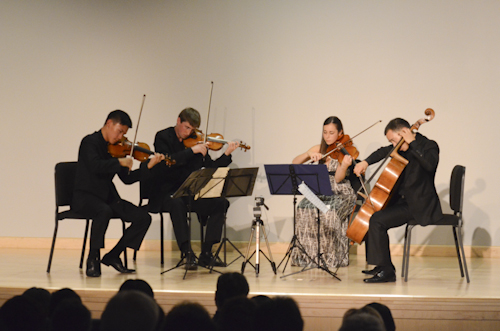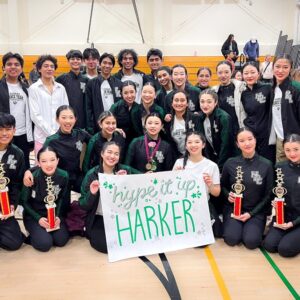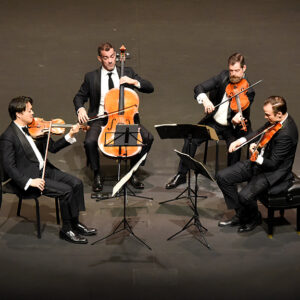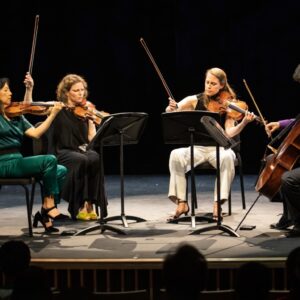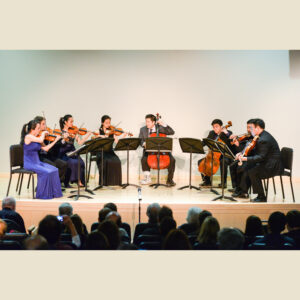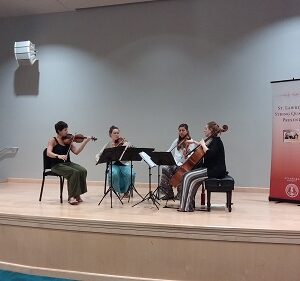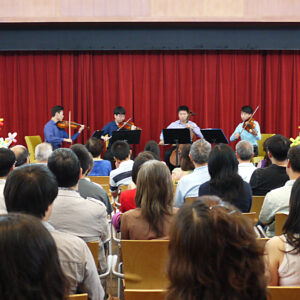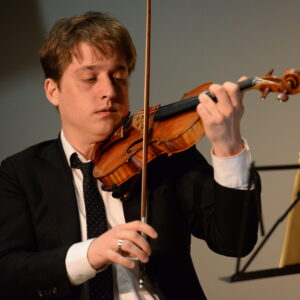The Parker Quartet was the latest in a line of top-flight classical performers to appear at the Harker Concert Series, as the Minnesota-based group of young, extraordinarily talented instrumentalists put bow to string for a packed house at the Nichols Hall auditorium on Oct. 26.
Following a brief introduction, the quartet opened with famed minimalist Arvo Pärt’s “Fratres,” adapted for string quartet. First violinist Daniel Chong and violist Jessica Bodner began with the piece’s foreboding harmonies, which were greeted by the cellist Kee-Hyun Kim’s percussive pizzicato, providing an effective, if somewhat violent, contrast to the delicate work of his partners. As second violinist Karen Kim was on sabbatical, David McCarroll served as her replacement that evening, providing a soft, constant hum behind the ominous and sometimes mournful lines.
Parker Quartet continued with British composer Benjamin Britten’s “String Quartet No. 2,” written after a visit to the liberated Bergen-Belsen concentration camp in 1945. The quartet effortlessly captured the first movement’s challenging, frequent and sometimes jarring shifts in tone, often characterized by disjointed staccato passages and calm, pleasant phrases broken up by sudden outbursts of disharmony. The animated second movement was given a very energetic treatment, its harsh and disquieting tones played with a fitting aggression that at times bordered on ferocity. “Chacony,” the piece’s final movement and also its longest, traversed peaks and valleys, revealing glimmers of hope. The quartet’s togetherness throughout was more than impressive, and though each member’s individual ability was already apparent, “Chacony” gave each the opportunity to showcase their immense virtuosity.
With the event taking place just five days away from Halloween, the Nichols Hall atrium was decorated with spooky accoutrements, including a punch bowl that boiled and bubbled like a witch’s cauldron.
Juanita Johnson, who was visiting from Modesto, said the performance was “delightful. I grew up in Jamaica, and there was music in my house at all times, and I heard all variations of it.” This upbringing later allowed her to “sit and listen to anything.”
Astara Marcia commented that the performance was “excellent. I’m a classical musician myself,” said the violist with the Palo Alto Peninsula Pops Orchestra. She also enjoyed the presentation of the event, saying “I’m very impressed. It’s a great way to get people to come back.”
After impressing with two unorthodox pieces, the quartet launched into the evening’s big crowd-pleaser, Franz Schubert’s “String Quartet No. 14,” subtitled “Death and the Maiden,” known to many a listener of chamber music. Like their performance of Britten earlier in the evening, the quartet took an almost explosive approach to the material, while at the same time allowing themselves plenty of subtlety in the quieter sections, particularly in the slower, funereal parts of the second movement. Kee-Hyun Kim’s aggressive pizzicato, as it had at several moments during the evening, was dominant without being overpowering. The festive bounce of the final movement was well-matched with Parker Quartet’s stylistic approach. Its fast-moving, intricate lines were also a fine showcase for the musicians’ splendid technique and tight interplay, which were in full effect right up until the rousing finish, which the audience met with loud applause.
